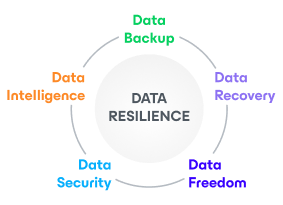Have you heard about the recent UniSuper and Google Cloud accident?
The recent data outage that impacted UniSuper serves as a stark reminder of the potential risks associated with relying solely on a single cloud provider and highlights the importance for businesses to prioritize data resilience to minimize downtime. To address these challenges, many organizations are now turning to the concept of hybrid and multi-cloud. By combining the benefits of multiple cloud providers and on-premises infrastructure, businesses can mitigate the risks associated with relying on a single cloud provider and unlock additional benefits such as improved scalability, reliability, and flexibility. The hybrid and multi-cloud approach offers a strategic solution that not only enhances data resilience but also ensures businesses are better equipped to handle unforeseen disruptions to keep their businesses running. In this blog we will discuss some of aspects that a hybrid/multi-cloud environment can help with:
Mitigating Downtime and Data Loss
Hybrid cloud offers businesses the ability to follow the 3-2-1-0-0 rule by creating redundant backups and failover mechanisms across multiple environments. The recent UniSuper data outage serves as an example of how data can be lost even with backups in the same cloud. Having a secondary environment, whether it is a private cloud or another public cloud provider, is crucial to ensure business continuity and minimize data loss. By distributing data and workloads across different environments, businesses can significantly mitigate the risks associated with relying solely on a single cloud provider.
Optimizing Costs
One of the significant advantages of hybrid/multi-cloud is the ability to strategically allocate workloads to the most cost-effective environment. Businesses can store data in a public cloud, taking advantage of its scalability and cost-efficiency, while keeping private cloud for greater control and security. This approach can result in significant cost savings on hardware, software, and IT staff, as businesses only need to allocate resources where they are most needed.
Enhancing Security and Compliance
Enhancing security and compliance is a top priority for businesses, and cloud providers like AWS and Microsoft Azure offer comprehensive security features that can help achieve these goals. Public clouds have extensive security controls in place to protect customer data, including encryption options for data in transit and at rest, data immutability, identity and access management tools, and thorough network security measures. By leveraging these secure and compliant cloud platforms, businesses can have confidence that their data is protected, and they can meet the specific requirements of their industry, whether it be healthcare, finance, or other sectors with stringent data protection regulations.
Achieving Greater Scalability and Agility
Businesses gain flexibility to scale up or down quickly based on demand when utilizing a hybrid/multi-cloud environment. This is particularly beneficial for businesses with seasonal fluctuations or unpredictable workloads. By leveraging the scalability of the public cloud for peak periods and combining it with the control and performance of the private cloud, businesses can effortlessly adapt to changing market conditions, ensuring their infrastructure can handle any workload efficiently.
Future-Proofing Your Infrastructure
Hybrid/multi-cloud is a forward-thinking approach that allows businesses to adapt to evolving technology trends and needs of the business. By implementing a hybrid/multi-cloud strategy, businesses are well-prepared for future advancements and can easily integrate new technologies or services as they emerge. This future-proof approach ensures that businesses can continuously optimize their IT infrastructure and stay ahead of the curve.
Fortunately, Unisuper was able to maintain business continuity during the recent Google Cloud outage due to their multi-cloud strategy. While there are undeniably numerous benefits to adopting a hybrid or multi-cloud approach, it is not without its challenges. These include concerns surrounding security, complex environments, and the intricacies of managing such a complex environment. This is where Veeam comes in.
With Veeam Data Platform and Veeam ONE, businesses can gain comprehensive visibility into their complex environments through a unified platform. This ensures high levels of data availability and security. By using the encryption and immutability features provided by AWS and Microsoft, we enable our customers to achieve resilient data protection, regardless of where their data resides. Additionally, our automation capabilities streamline the backup process, freeing up valuable time for businesses to focus on strategic initiatives.
